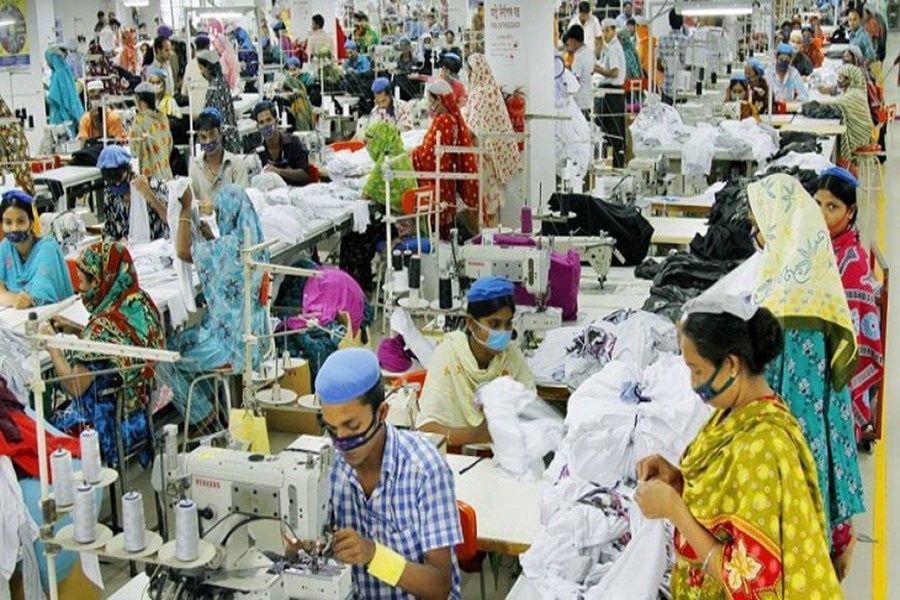The International Trade Union Confederation (ITUC) has alleged that Bangladesh reported to the ILO little or no progress on implementation of a roadmap to improve the workers' rights agreed earlier this year.
The ITUC that represents 200 million members of 332 affiliates in 163 countries and territories also identified 10 areas of inaction by the government of Bangladesh, said a statement issued by the ITUC on Thursday.
Bangladesh is supposed to report the progress of implementation of the roadmap within a timeframe set by the International Labour Organization (ILO).
Meantime, the ILO governing body in its last session held early this month asked Bangladesh to report the progress made to address all the outstanding issues mentioned in the 'article 26 complaint' in next March.
The ILO also deferred its decision on further action in respect of the complaint to its session scheduled to be held on November next year, according to an ILO's draft decision.
At the 108th ILO session in mid-June 2019, labour representatives from Italy, Japan, South Africa, Pakistan and Brazil lodged complaints against Bangladesh for non-observance of ILO's three core conversions and sought enquiry commission in this regard.
Dhaka was accused of discontinuing convention 87 on freedom of association and right to organise, convention 98 on right to organise and collective bargaining, and convention 81 on labour inspection.
Bangladesh on May 23 this year submitted a time-bound final roadmap of actions to the ILO while it sent the report on progress made with its timely implementation on September 30, according to labour ministry sources.
In the roadmap, Bangladesh indicated four priority areas - labour law reform, trade union registration, labour inspection and enforcement and addressing acts of anti-union discrimination/unfair labour practices and violence against workers.
Bangladesh made a time-bound commitment to address all the issues including labour law reform by 2022 and others by 2026.
According to ministry sources, the roadmap would impact all economic sectors and would involve the wider engagement of stakeholders across the sectors.
"Article 26 complaint is the highest sanction that can be levelled by the ILO against a country for abuse of workers' rights," the ITUC said in the statement.
It also alleged that Bangladesh used delaying tactics and was continuing to put the lives of working people at risk.
Every day of delay puts the lives of working people at risk, the statement said, adding the roadmap, if implemented, will put in place a floor of rights for all workers in Bangladesh.
But the government must be serious about a timeline to deliver the changes set out by workers and their unions, it said.
"The government of Bangladesh must hold employers to account for unsafe working environments and recognise that unions provide workers with justice and protection of their safety. Unions should be recognised in all sectors of the economy," ITUC general secretary Sharan Burrow said.
The ITUC indentified that the labour inspection systems are not adequately resourced, and sufficient personnel have not been recruited and independent unions are still denied registration and are discriminated.
Where tripartite monitoring or consultative committees were to be set up, it said the conditions precedent for meaningful and productive consultations or effective monitoring were non-existent, including a published schedule of meetings, meeting notices, list of issues and relevant briefing documents.
Occupational health and safety modalities for the export processing zones have not been adopted, and the EPZ authorities still have power over labour inspectors and OSH officers, contrary to ILO Convention 81 and in the face of reports of occupational injuries and deaths, said the ITUC.
No steps have been taken to address anti-union discrimination, unfair labour practices and violence against workers while there is no database for complaints of anti-union discrimination, unfair labour practices and attacks against unions.
A long backlog of labour disputes remains, with growing complaints of corruption and injustice against the judiciary and there is growing intolerance by the security forces for the exercise of trade union rights and activities.
The ITUC also alleged that the police and other security forces have not been held accountable for the attacks during the Ashulia demonstrations of 2016 and 2019, and the government has failed to institute an independent inquiry as recommended by the ILO Committee on Freedom of Association.
No mechanism has been established to provide regular information to workers on their rights and on how to lodge complaints and access legal support in case of violations.
The ITUC called for immediate implementation of a tripartite committee to engage in social dialogue, the basis of modern industrial relations and a new system of alternative dispute resolutions to resolve grievances, an end to the backlog of cases, and rebuilding of trust with workers.
It also suggested for an evidence-based minimum wage for workers in all sectors.


